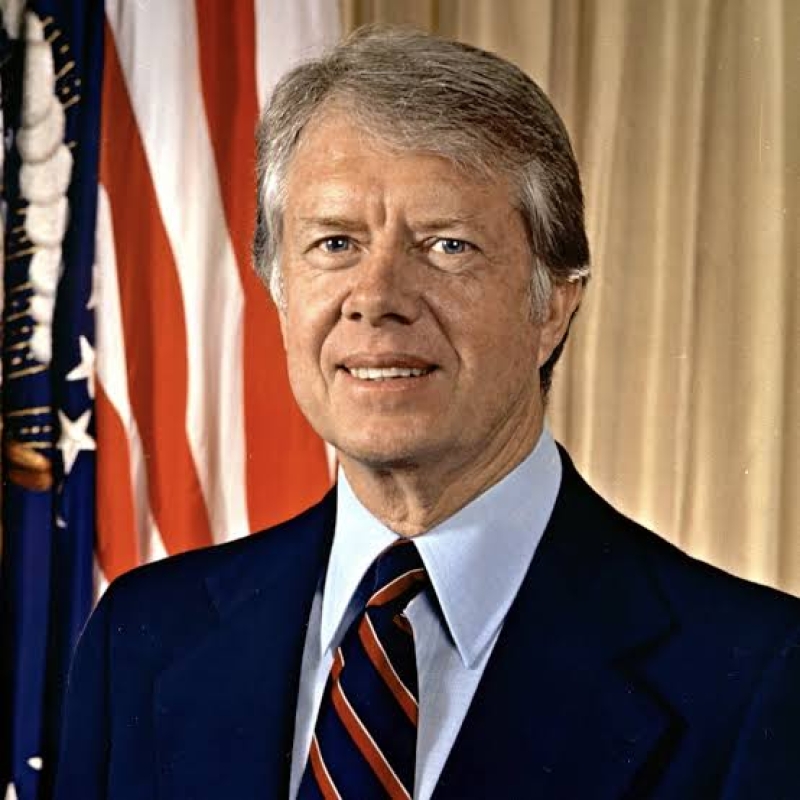- CA Yunus pays homage to Liberation War martyrs on Victory Day |
- Bangladesh capital market extends losing streak for second day |
- Bangladesh celebrates Victory Day Tuesday |
- 'Different govts presented history based on their own ideologies': JU VC |
Jimmy Carter wanted democracy to shine in Bangladesh. Do we?

Jimmy Carter, former President of the US.
James Earl Carter Jr, the 39th President of the United States, has been described as a decent politician who used to uphold the values of democracy, peace, morality and honesty. The recipient of the Nobel Peace Prize for 2002 for promoting reconciliation between Egypt and Israel. He has died at the age of 100.
Known for his promotion liberalism, Jimmy Carter visited Bangladesh for a second time in late 2001 to prepare the US National Democratic Institute and the Carter Foundation to observe the general elections held in October that year. After the September 11 attacks on the Twin-Tower in New York he refrained from observing that polls.
Addressing journalists at the conclusion of his preparatory visit he told a questioner, observing election in Bangladesh is very rewarding because polls here were viewed as a 'national past time' and everybody including even a rickshaw-puller appears to believe that he has a say in who should become the next Prime Minister.
This vibrant democracy was in shackles for 15 years from 2009 to July 2024 when an atmosphere of fear prevented people from freely expressing their opinions on politics. The atmosphere of freedom of speech is back again but new clouds over the timing of fresh general elections have to some extent started overshadowing the victory of the movement for democracy on August 5 2001.
When students the movement for job quota reforms from July 1 and they received spontaneous support from across the country due to degrading comments made from the highest level of the administration followed by a killing mission to suppress them. The people joined them and turned the movement into a revolt compelling dictator Sheikh Hasina to give in and flee the country.
Killings, enforced disappearances, suppression of democratic and human rights, destruction of all democratic institutions, limitless corruption, plunder of the economy, looting of the banks and turning those unsustainable plus flight of at least 225 billion dollars out of the country made the opposition political leaders to frame a 31-point charter to rebuild the state and its economy.
The Interim government headed by Nobel Laureate Prof. Muhammad Yunus enjoys the support of all to carry forward reforms. He however seems to have been wrongly advised to seek a longer term of his interim administration to get all reforms planned and executed after achieving consensus through a consensus building commission which is a creature of wild imagination and might defer elections.
The political leaders do not want the Interim Government to fail, and have started pressurising it to prepare for elections at the minimum possible time. Because election will bring the people's representatives who will have the mandate and be competent to do the reforms that they have spelt out braving repressions during the closing years of the fascist administration.
So reforms are not new things to be invented anew. These have been in public discourse for at least a decade and sumarised in the 31-point programme of the Bangladesh Nationalist party and its political allies in the 12-Party Alliance, the Ganatantra Manch and the Islami Oikya Jote. These political parties held rallies amid police repression and even organised open road marches demanding resignation of the government that had its fangs to make power secure for the foreseeable future.
The politicians deserve the credit for bringing the people's sense of deprivation to a boiling point to join rallies swimming across rivers when all modes of transport were closed. Political leaders had to reach venues ahead of time and remain in hiding to escape arrest before coming to such rallies first in all administrative divisions and then in Dhaka on 10 December 2022 and finally on October 28, 2023 before being ruthlessly suppressed to hold an one-sided election on January 7 2024 by sending most political leaders to jails.
The interim government should not risk losing its consensus base. Appointment and transfers to key positions should be made keeping the base of consensus is view. Already some sections in the political arena have started complaining about this. A move to float a political front in disguise has come up for criticism among political circles. This is clearly against building of sustaining consensus. The decision makers in the Interim Government should realise this.
Call for unity after creating divisive trends is bound to fail. Cancellation of accreditation cards of all journalists in one go is not a prudent decision. The administration could have cancelled the fake accreditation cards issued to people of other professions including politicians by the last government. It would have taken not more than a day to identify the genuine journalists holding the cards and then cancel the suspicious ones. Time is ripe to mend the mistakes.

